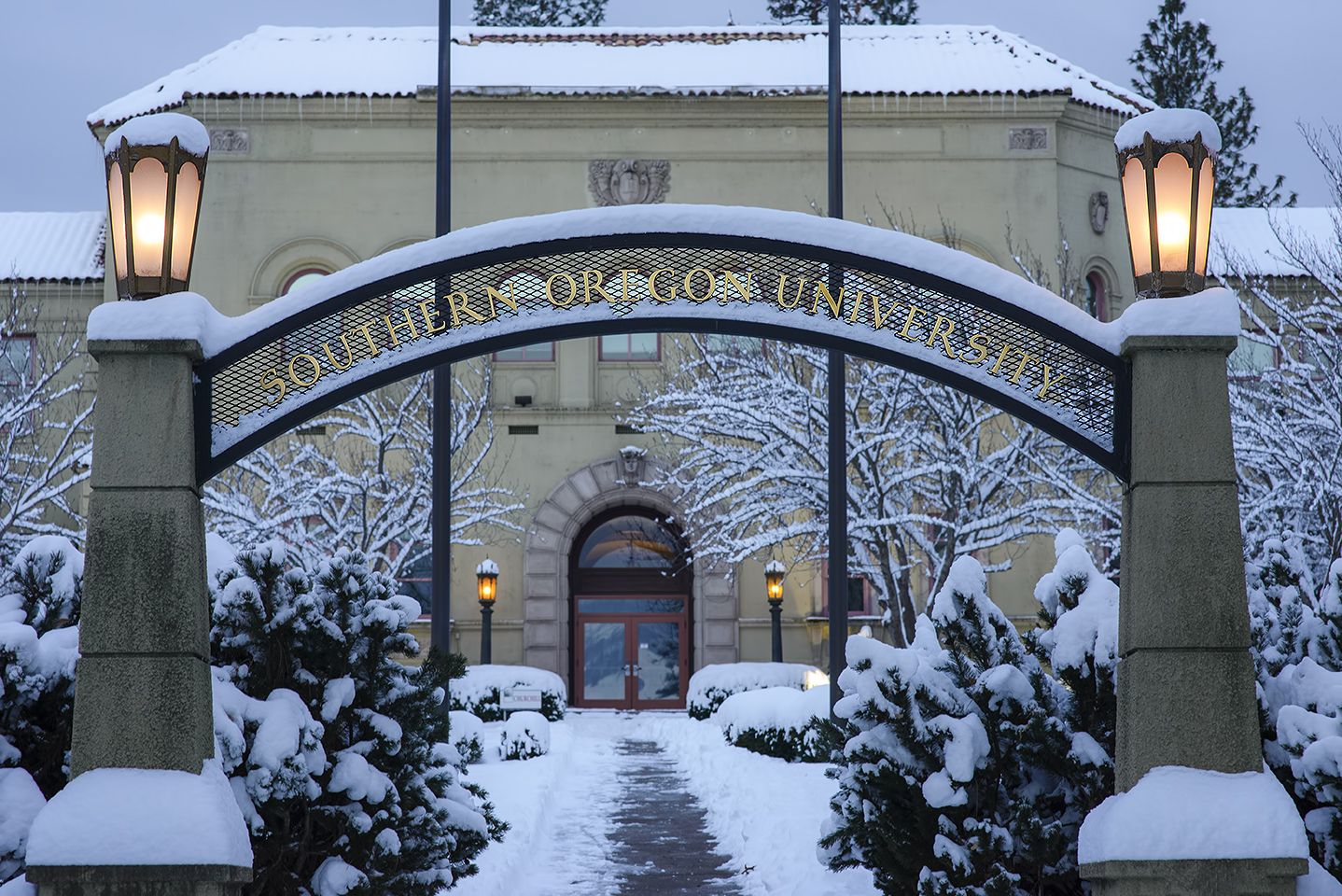
Southern Oregon University is committed to protecting the safety of staff, faculty, students, and visitors. Severe weather conditions, especially during the winter, may bring about the curtailment of classes or on-campus work operations. Similarly, wildfires can be a significant source of air pollution in the area and can pose a major health risk.
Please keep in mind that the decision to close a campus (Ashland and/or Medford) due to severe local conditions rests with the University President or designee and is determined after considering several factors (e.g. city alerts, national weather updates, road closures, traffic conditions, air quality levels, etc.). As a residential and liberal arts institution, SOU has many functions that continue regardless of conditions.
University employees deemed by their supervisor as critical to providing on-campus essential services must continue to report to onsite work during the closure or curtailment (e.g. Campus Public Safety officers, dining services personnel, select Facilities Management and Planning staff, select Information Technology staff, etc.).In the event of extreme inclement weather/hazardous conditions, please follow these instructions:
- Check SOU Alerts. In the case of an emergency, this mass notification system quickly sends alerts through email, phone, and text messaging. Every effort will be made to communicate a closure as early as possible but not later than 6:30 a.m. Supervisors may also contact their staff directly and prior to the start of their shift in the event of a closure or delayed start.
- Check the SOU website at www.sou.edu, or contact 541-552-7672 (Ashland Campus) and 541-552-8100 (Medford Campus).
- Tune in and listen to the following radio and TV stations to stay on top of the situation:
-
Southern Oregon Radio and TV Stations Ashland KSOR KSMF Ashland to Gold Hill KSJK KSRG Grants Pass KAJO
KLDRKAGI KSMF Klamath Falls KLAD AM/FM
KSKF
KFEG
KNYRKKKJ
KFLS
KYSFKLMF
KKRB
KAGO AM/FMMedford KCMX AM/FM
KOOL
KAKT
KOBI TV
KSYS TVKRWQ
KBOY
KMED
KTVL TVKISS
KTMT
KZZE
KDRV TVYreka KSYC AM/FM KWHO KNSQ
- Become familiar with the Wildfire Smoke Policy and keep up on air quality levels at https://aqi.oregon.gov/. Wildfires can be a significant source of air pollution in the area and can pose a major health risk. With the foliage that is present in our region, wildfires can occur and create an air quality hazard. The smoke from a wildfire compounding with the topographic nature of the area creates a bowl effect with the surrounding hills that prevents effective air movement. Smoke is made up of primarily small particles, gases, and water vapor, with trace amounts of hazardous air pollutants. The most harmful are the small particles, or particulate matter smaller than 2.5 micrometers in diameter. These particles can be inhaled deeply into the lungs, damaging lung tissue, and causing respiratory and/or cardiovascular problems. Symptoms from short-term smoke exposure can range from scratchy throat, cough, irritated sinuses, headaches, runny nose, and stinging eyes. Persons with asthma, emphysema, congestive heart disease, and other existing medical conditions can have more serious reactions.
- Review the Use of Leave During Campus Closures (including delayed openings) for clarification on paid inclement weather leave and when essential classified staff could request pay at a rate of double time-and-one-half (inclement weather leave + 1.5 times pay for the 2.5 rate).
- University employees deemed by their supervisor as critical to providing on-campus essential services must continue to report to onsite work during the closure or curtailment (e.g. Campus Public Safety officers, dining services personnel, select Facilities Management and Planning staff, select Information Technology staff, etc.). When reporting to campus for work, employees are expected to use their best judgment in assessing the risk of coming to campus based on individual circumstances.
- All employees with a telecommuting arrangement should continue remote work at the regular rate of pay or request and receive approval from their supervisor to use appropriate accrued leave (e.g. vacation, compensatory time off, personal day, etc.). In the event that inclement weather disrupts one’s ability to perform their work remotely, they should contact their supervisor to discuss the circumstances and devise a plan accordingly (i.e. use of inclement weather leave, flex work shift, etc.).
- Classified staff not identified above and who are unable to perform their work remotely shall be allowed to access inclement weather leave and must designate it on the official leave record in Workday.
- Unclassified administrative non-exempt staff and student employees not identified above and who are unable to perform their work remotely, do not receive compensation unless the application of available and eligible accrued leave is applied or the president deems the closure as paid.
- All employees already on approved leave (e.g. vacation, personal day, sick, etc.) shall continue to record this time in Workday accordingly.




